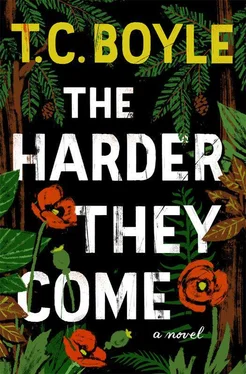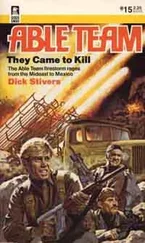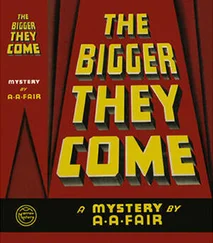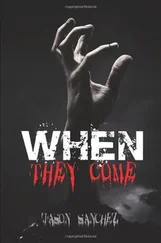She was holding on to his arm still and the light was flowing over the dog where it lay in the rug of its fur on the kitchen floor and the smell of the simmering sauce was tugging at his glands, the salivary glands that looked like trussed-up sacks of tapioca pudding in the illustration in his biology text from school, and another phrase came to him that had nothing niggardly in it at all: Go with the flow . He said it aloud, “Go with the flow,” and she gave his muscle another squeeze.
THE WHOLE IDEA OF a vacation, of a travel vacation, was to clear out the cobwebs, put your troubles behind you and come home refreshed. Well, it hadn’t quite worked out that way, had it? As he reminded Carolee every chance he got. His stress level was so high the first week home he had to go to the doctor to check on his blood-pressure medication and see about a refill on his Xanax, which he never took anymore, not since he’d shut the door behind him at the high school for the last and final time. It wasn’t enough that they’d been attacked or that the ship had been delayed in Puerto Limón for a full twenty-four hours while the Costa Rican bureaucrats conferred with the cruise line bureaucrats and the State Department flunkies so that when the boat did finally get to Miami they’d missed their flight to San Francisco or that the flight they did manage to get on was delayed for three hours because of fog on the other end — no, it was the press, the press was the real and continuing plague because they kept the whole thing going when all he wanted was to turn the page and forget about it. They didn’t care what he wanted. They never even asked. They just came after him.
Within an hour of his walking out of that room in the bowels of the ship, even before he and Carolee had got through the first bottle of Perrier-Jouët sent compliments of the captain and delivered by Kristi Breerling herself, his cell began ringing. Exhausted — wiped — and half-drunk too, he wasn’t thinking and just put the phone to his ear and rasped, “Hello?”
A voice came back at him, an unfamiliar voice, distant but clear. A man’s voice. “Mr. Stensen? Sten Stensen?”
“Yeah?”
The voice gave a name and an affiliation and without pausing to draw breath began hammering him with questions, each more inane and intrusive than the last—“What was it like out there? How many of them were there? How do you feel, you feel any different? You are a senior citizen, right — seventy years old, is that right? A war veteran? Did the alleged attacker say anything to you? He had a gun? Or was it a knife?” He tried to answer the man’s questions as patiently as he could, though Carolee was hissing at him to hang up and all he could think of was the cruise line’s slogan— Experience World-Class Indulgence —and wonder how in Christ’s name this reporter had managed to get his cell number, but finally, after a question about his service record— In Vietnam, was it? — he broke the connection even as the call-waiting light flared and he shut the thing off and stuffed it deep in his pocket.
“Who was that?” Carolee demanded.
“I don’t know. Some reporter.”
It was dark out over the water. They’d pulled the sliding door of their private veranda shut to thwart the mosquitoes and whatever else was out there — vampire bats, he supposed. The champagne in his glass had gone warm. He took a sip and made a face — it tasted like club soda with a dash of bitters and no more potent.
Carolee was giving him her severe look, her mouth drawn down and her eyebrows pinched together, a crease there in the shape of a V she’d been working on for sixty-four years now. “You don’t have to talk to those people,” she said.
The glass went heavy in his hand. He could barely hold his head up. “Yeah,” he said, “and you don’t have to swat flies either.”
Of course, part of the problem that first week was that he couldn’t seem to say no. He was a celebrity, an instant celebrity, the story plumbing some deep atavistic recess of the American psyche, and forgive him, because he knew it was wrong in every way, but after the third or fourth interview he began to feel he was only getting his due: Ex-Marine, 70, Kills Tour Thug; Quick Thinking Saves the Day; Costa Rica Tour Hero . If he stopped to think about it he would have been ashamed of himself — he was being manipulated, and worse, glorified not for any virtue, but for a single act of violence that haunted him every time he shut his eyes — but he didn’t stop to think. He’d never been interviewed on the radio before — or on TV either — and that shot up the stress level, of course it did, but he went through with every request until the requests began to trickle off in the wake of newer and riper stories, the mass shooting of the week, the daily bombing, the women imprisoned as sex slaves and all the rest of it.
There were calls from Hollywood too, producers making promises, naming sums, gabbling over the line like auctioneers — and that was what this was, an auction, make no mistake about it — but none of them ever followed through and he never received a letter from a single one of them let alone a contract or, god forbid, a check. But he didn’t want a check, didn’t want to be inflated any more than he already had been — who in his right mind would ever want to see a movie made out of his life, anyway? The camera pans down the street to focus on a frame house in need of paint in the sleepy lumber town of Fort Bragg, California, and there he is, ten years old and emerging from the front door to do something dramatic like walk to school, and here’s his mother calling to him like June Lockhart in Lassie, then we shift to the high school years, the junker car, the prom, Vietnam, college and Carolee, the birth of their son, student teaching, the rise up the rocky slope to the great and shining plateau of school principal, and all of it circling round the cruise ship and the blighted dirty jungle and one climactic moment to justify it all, this American life . Who would they get to play him — Sean Connery? Tommy Lee Jones? Travolta? Absurdity on top of absurdity.
As it turned out, he did agree to one TV appearance, gratis, with a station out of San Francisco, which sent one of their newswomen and two support people to the house and filmed him sitting in the rocker on the front porch with the blue pennant of the ocean flapping in the distance. When it aired that night on the six o’clock news, he saw himself loom up on the screen like something out of one of the Japanese horror flicks he’d loved as a boy— Rodan, maybe, or Godzilla —his eyes blunted, his face scaled and gray and his big fists clenched on the arms of the chair as if he was afraid of falling out of it. Were you scared? the TV woman asked him and he said he was too angry to be scared, his voice like the leaky hiss of an air hose. It all happened so quickly, she prompted. Yeah, he rasped, looking into the camera with his face absolutely frozen, something like that. And you just reacted? Yeah, he said, I just reacted .
By the second week, things had died down to the point of extinction as far as the press was concerned, but he couldn’t go anywhere without somebody giving him a thumbs-up or calling out to him, people he didn’t even know. It was as if he belonged to them now, the whole community, as if he’d graduated from being a retiree and homeowner to another level altogether. And that might have given him some satisfaction — it did — but somehow all he could see was Adam’s face, twisted in a sneer. Big hero . Yeah. Sure. That about summed it up. What was he going to do, run for mayor?
Читать дальше












